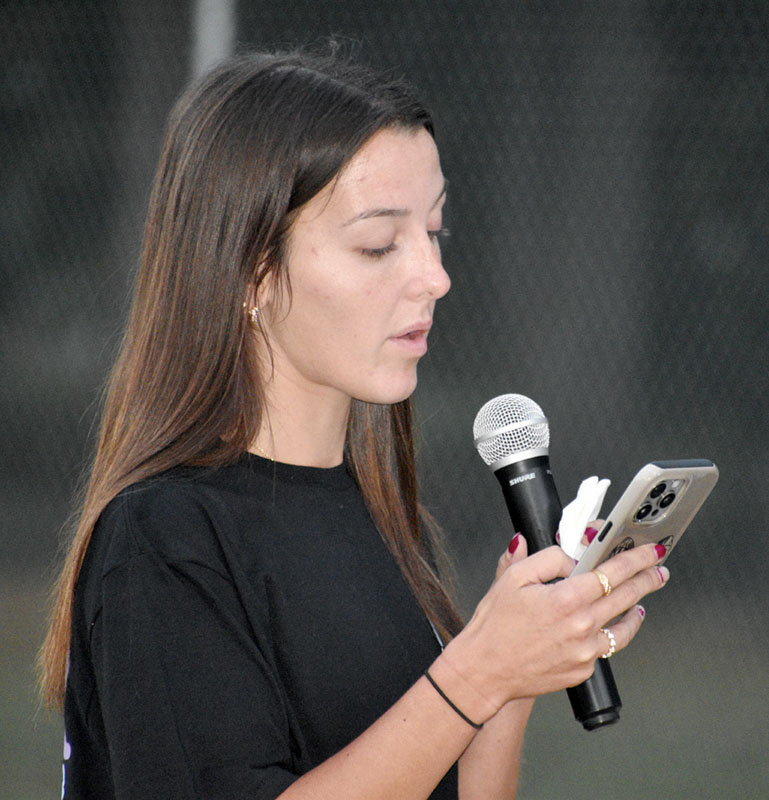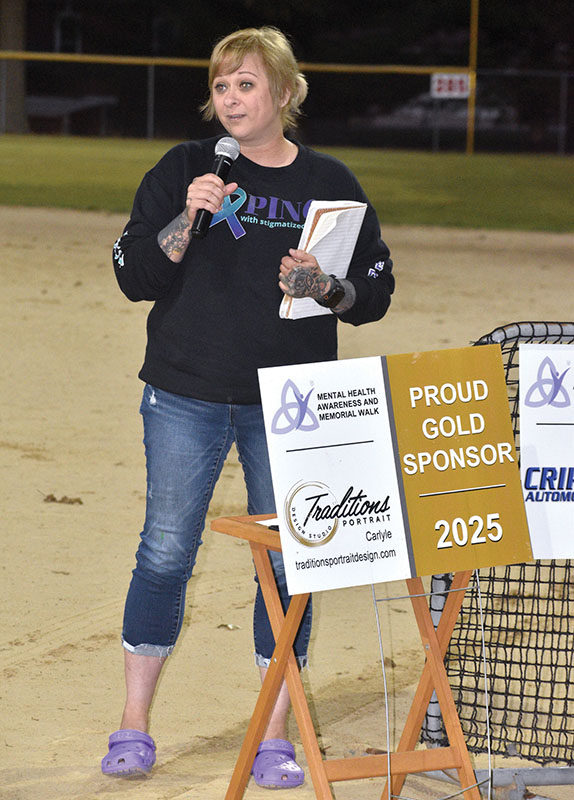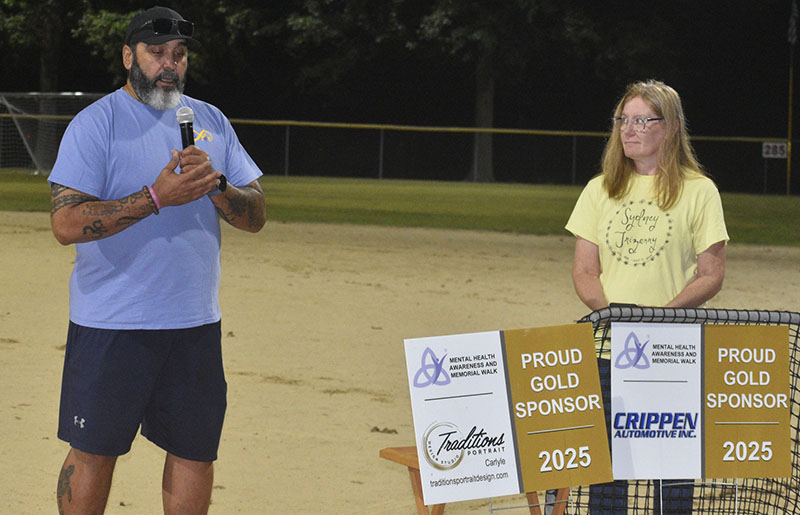 Claire Moran speaks during the eighth annual mental health awareness and suicide walk. The community came together to support mental health awareness on Friday, Sept. 26, at Lehrter Park in Albers.
Claire Moran speaks during the eighth annual mental health awareness and suicide walk. The community came together to support mental health awareness on Friday, Sept. 26, at Lehrter Park in Albers.
The eighth annual mental health awareness and suicide walk had a great crowd on a nice night for a mile walk through town. The event was organized by Shelley Kenow. Keynote speakers were Claire Moran and Coping 4 Life intern Nellie Paskavich. The event was started in 2018 after the loss of Albers teenager Sydney Irizarry to suicide. All the proceeds from the event went to the Swing for Sydney Foundation.
Kenow read a letter from her daughter, Violet Thuma, who was friends with Irizarry from prekindergarten through high school. The letter said on the day Irizarry committed suicide she missed school, but no one thought much of it. She had told her friends she had started taking an anti-anxiety medication, but they figured they would get through everything together. Irizarry didn’t let her friends know how bad things had truly gotten. The letter said Irizarry’s death shocked everyone.
Thuma said when her parents came after school in the middle of tech week for the spring musical, she knew something serious had happened. Her mom was panicked and Thuma’s stomach dropped and her head started buzzing because she knew something terrible had happened. Her mom said all of the family was fine, and she knew then there was something wrong with Irizarry. Thuma thought a car accident or a major injury, but never expected Irizarry to be dead. Nellie Paskavich speaks during the eighth annual mental health awareness and suicide walk on Friday, Sept. 26, at Albers. Thuma and Kenow went straight from the high school to the Irizarry home, where they found a police car in their driveway. The next clear memory Thuma had was collapsing on the floor of their house where she broke down and was uncontrollably sobbing and muttering. In the next few days, Thuma was in shock and wasn’t functioning. She remembers hating every second of Irizarry’s funeral and thinking that her best friend should not fit in that little box.
Nellie Paskavich speaks during the eighth annual mental health awareness and suicide walk on Friday, Sept. 26, at Albers. Thuma and Kenow went straight from the high school to the Irizarry home, where they found a police car in their driveway. The next clear memory Thuma had was collapsing on the floor of their house where she broke down and was uncontrollably sobbing and muttering. In the next few days, Thuma was in shock and wasn’t functioning. She remembers hating every second of Irizarry’s funeral and thinking that her best friend should not fit in that little box.
Thuma said she will never get over Irizarry’s death, even though these days the grief is more manageable. She said she lost the only person who knew every version of her and loved each one. Thuma said life is bigger and harder now, but also more joyous. Thuma wishes Irizarry wouldn’t have let the hard days win so she could share her joys with her.
Kenow said she never wants another family to go through what the Irizarrys are going through every single day, which is why she organizes the event every year.
“This is a horrible feeling, but what I feel is nothing compared to what her parents feel,” Kenow said. “We have to end the stigma that needing help is bad or wrong or it makes you less capable. We have to continue to bring awareness that getting help is good and it shows strength.”
 Andre Irizarry speaks at the eighth annual mental health awareness and suicide walk on Friday, Sept. 26, at Albers, while organizer Shelley Kenow looks on. Photos by Matt Wilson Moran then told her story. Her story with mental health began when she was in grade school when her thoughts were often filled with self criticism and self doubt.
Andre Irizarry speaks at the eighth annual mental health awareness and suicide walk on Friday, Sept. 26, at Albers, while organizer Shelley Kenow looks on. Photos by Matt Wilson Moran then told her story. Her story with mental health began when she was in grade school when her thoughts were often filled with self criticism and self doubt.
“At an age when most kids were learning to play and imagine, I was learning how to tear myself down from the inside,” Moran said. “I didn’t have the words for it back then, I didn’t know what mental health even was. All I knew was that my mind was a place that didn’t always feel safe.”
She began to cope in harmful ways. She still has small scars on her forearm, but she said today those scars are proof of how far she has come. Back then she didn’t feel strong; she was embarrassed.
“I thought I was crazy,” Moran said. “And if I thought I was crazy, my family and friends would think so, also. That made telling someone one of the hardest things I have ever done.”
Moran still remembers the morning she told her mom, not because she wanted to, but because she felt she had to. She felt like she was about to shatter her mom’s world, but somehow, she found the words. Her mom began to cry and hugged her for a long time. She said her mom’s tears were of love about seeing her child finally opening up about a battle she never knew was happening.
“After that moment, things started to shift,” Moran said. “I began meeting with a school counselor and a therapist. I slowly started to rebuild the relationship with myself. It wasn’t easy, it was like trying to re-wire my brain one small thought at a time.”
Moran said she worked hard on loving herself more and then the negative thoughts became few and far between. In high school her past negative thoughts started catching up to her. Her friend group became filled with judgment and drama. She was in a relationship that was emotionally and physically abusive. Home life was it’s own battle and it never felt steady.
Moran had shoulder surgeries that took away her one outlet that always helped her cope: sports. Sports had been her healthy escape and anchor, and without them she spiraled. Around that time, she had started learning about chemical imbalances in the brain. That helped her understand that her struggles weren’t random and they were linked to a complicated mix of biology, life experiences and emotional pain.
She said it wasn’t one thing that broke her, it was everything all at once. The night she attempted to take her own life wasn’t planned. Every negative thought ran through her mind as she sat in her basement bedroom alone. Not one thought was positive or uplifting, every word was tearing her down. She took the entire bottle of leftover opioids from her shoulder surgery and texted her best friend “I love you.”
Later that night, her mom and sister Audrey came home. Audrey and Claire shared a room at the time. Audrey found Claire and at the age of 14 called 9-1-1 and began CPR on her older sister. There was a weekly meeting at the firehouse that night and they arrived within seconds. They administered multiple doses of Narcan, drove her to St. Joseph’s Hospital, and then she was flown to Children’s Hospital in St. Louis. The next thing Claire remembers is waking up in the ICU with a tube down her throat and her family all around her.
“All I could feel was anger,” Claire said. “When I woke up again in a different room, I was even angrier. I told my mom and family that they should have let me die and that I didn’t want to be here anymore. Hearing those words today makes me want to hug my 16-year-old self. If only that sweet girl knew how much life she still had to live and experience.”
Claire was then admitted to a rehab facility where she met Dr. Wilson, who she said made all of her crazy thoughts make sense. The staff treated her with kindness and compassion. For the first time in a long time, she didn’t feel broken and that is where she began to blossom. She started seeing a psychiatrist regularly. She had to surround herself with people striving to be the best version of themselves. She learned to put herself first, even when life made it hard. She returned to the gym and some sports. She set small goals and celebrated them, knowing they would lead to bigger ones. The bad days didn’t disappear, but she stopped letting them define her. She started believing she had bigger goals for herself.
“Little by little, I taught myself how to live again,” Claire said. “Now, seven years later at age 24, I can look back and see the growth. It has taken constant work, effort and love to get where I am today. I am here because of my determination but also because of the people who saved me. My sister saved my life that night, but everyone who helped me that night are earth angels.”
Claire said mental health matters in every single life. She said asking for help is not embarrassing or shameful, it is strength. She said the people in your life would rather help you, listen to you, and hold you up, than watch you suffer in silence or feel that you had to fight your battles alone.
“Reach out, don’t wait until it’s too late,” Claire said. “Reach out to people. Reaching out is the first step to seeing light in what feels like a never ending tunnel.”
She said sharing her story was not easy. She felt the anxiety building up all week. She said healing is a journey that she is still on and she is still working on her mental health every single day. Every day, Claire reminds herself that progress matters more than perfection.
“Today, I stand here, not as a 16-year-old girl who gave up on herself, but as a 24-year-old woman who refused to stay down,” Claire said. “I am still here and every single day I am thankful. If my story can get even one person encouragement or hope, then my darkest moments will be a light for someone else.”
Paskavich works with substance abuse and family support. The future goal is to try to expand services for Clinton County for substance use prevention and recovery. She works with grief due to stigmatized death, which is death by overdose or suicide.
She was on a 708 board of mental health when she was in college and from there she took a job at Chestnut Health Systems where she coordinated a Resident Opportunities and Self-Sufficiency grant for Clinton County. She did a survey for Clinton County that turned into the baseline data for the state for mental health and substance use.
Paskavich said suicide in rural communities in Illinois is 20 per 100,000 people. Clinton County has a little over 40,000 people. Death by overdose is 26 per 100,000 people. People who use alcohol are 10 times more likely to die by suicide in a rural community. Twenty-five percent of veterans who live in rural communities and 28.2% of 100,000 people who are veterans died by suicide in 2022. That ratio of social workers in Clinton County is 2,500 people to one social worker. Paskavich said more community engagement like programs are needed.
Paskavich works in recovery and said recovery has a stigma because most people think recovery is addiction. She said recovery is all things. Paskavich said she was an active substance user and she knows about past drugs, helping people to stop using drugs and how it feels to be a parent of an addicted loved one. She said addiction is very dangerous now if using powder or pills there is a large likeliness you might wind up dead because it has fentanyl in it.
Paskavich said there are two parts to addiction: physical and mental.
Paskavich became a teen mother at the age of 17. She began using drugs with her father at the age of 13 and she continued to use drugs until 2001.
“I was not a great parent and was doing things I shouldn’t have been doing,” Paskavich said. “I didn’t know how to have relationships. Not only do people not know how to have great relationships, they also don’t have that opportunity.”
Paskavich said recovery is something you walk alongside daily.
“I’m thankful to be here today,” Paskavich said. “I love helping all of wonderful Clinton County. I love working with kids. I love working with families. I’m thankful that my experiences in all of these things I can give some guidance and support for others.”
Paskavich said she saw first hand the effects of death by suicide when her step-father took his own life. Her mom did not receive counseling or care and it was very hard on her. She said these circumstances are very hard to deal with and they happen too much in our small community.
“We have to do something because it is happening more and more,” Paskavich said. “It is becoming way too common. We need to find a path to recovery for all things mental health related.”
Andre Irizarry thanked Kenow for running the event and Moran and Paskavich for speaking. He stopped by a lot of the schools in Clinton County and the Swing For Sydney organization donated a combined $10,000 for the schools to use for mental health awareness. The Swing for Sydney organization also supports life savers programs at Central, Wesclin and Mascoutah.
“Losing somebody to suicide is something that will stay with you forever,” Irizarry said. “It affects your relationships, your work, and many different things.”
The crowd than listened to the song “I am Enough” before going on the one-mile walk through Albers.
When they returned from the walk, everyone was given a tea light. Everyone was asked to put their tea light in their house and turn it on when they were having a bad day. Everyone then turned their light on and proclaimed, “I am enough.”
Everyone received a swag bag with mental health information that the Wesclin High School Lifesaver group, Central High School football cheerleaders and Central competitive cheerleaders helped put together.







